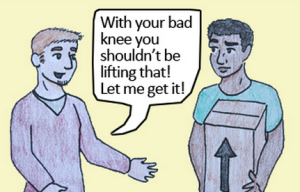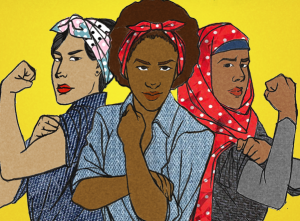They cook meals in your kitchens. They clean your houses. They help you raise your children and they care for your elderly relatives. Their work makes it possible for you to balance your lives, ensure your families are safe and healthy, and keep your life in order.
They’re domestic workers – and although for some Americans, they’re integral members of the household, they’re also some of the most abused workers in the country.
Domestic workers are often underpaid, overworked, and exploited. They don’t earn fair wages. They have no recourse against their employers when they violate their rights. And many of them even work under illegitimate conditions.
This isn’t okay. And it’s time for feminists to stand up and say so.
Almost all domestic workers are women, and almost half are immigrants. But despite the fact that their struggle is intertwined with and magnified by issues of gender, race, and class, they’re often in the shadows of the feminist movement.
It’s time for us to take up the cause and champion domestic workers’ rights – and here are three really important reasons why.
1. Because Domestic Workers Are Mostly Women
A whopping 95% of domestic workers are women.
In our culture, domestic work is seen as “women’s work,” and domestic workers are part of what is unsurprisingly one of the most gendered career fields in the country.
There are currently millions of women employed as domestic workers, and many of those women also live at the intersection of one or more additional oppressions: 46% are immigrants, 35% are undocumented, and 54% are of color.
Although the face of domestic work has evolved, its history as a low-wage realm populated mostly by women of color isn’t new.
From the nineteenth century through the New Deal and until the 1960s, most domestic workers were Black women – because their work was directly built on legacies of slavery. As Black women left the occupation, migrant women began to take their place, which changed the conversations around domestic workers’ rights and shifted the needs of that workforce.
Domestic labor has been around for centuries. Cooking, cleaning, child rearing, and caring for the elderly are all tasks countless women have done and continue to do for little pay and recognition.
And for domestic workers, that legacy of sexism associated with the roles they fulfill makes them vulnerable to marginalization at work.
For domestic workers, “doing women’s work” means surviving poor working conditions with little room for relief or justice.
And no feminist should stand for it.
2. Because Domestic Workers Are Regularly Exploited and Mistreated
When the National Domestic Workers Alliance conducted the first-ever national survey of American domestic workers, they were able to glean what conditions those women faced every day when they reported for duty.
Their findings were not pretty.
They heard stories of widespread abuse and exploitation:
Twenty-three percent of domestic workers make less than the federal minimum wage, and 67% of live-in domestic workers make less than the minimum wages in their states. (The median income of a live-in domestic worker, by the way, is $6.15 an hour.) 48% of domestic workers don’t make enough to get by.
Thirty-five percent reported working long hours without breaks, and 25% of live-in domestic workers reported being unable to sleep for more than five hours at a time uninterrupted.
Thirty-six percent of live-in domestic workers have been verbally harassed, and others face threats, sexual abuse, and physical abuse in the day-to-day of doing their jobs.
They also found that for most domestic workers, the nature of their work is that it is informal at best and illegitimate at worst:
Seventy percent of domestic workers don’t have contracts, and 30% of those who do have employers who openly violate the terms.
Of those fired, 23% are let go because they complain about their working conditions and 18% because they protest those employers violating their contract terms.
For these reasons, 91% of domestic workers suffering through bad conditions told the surveyors they feared losing their job if they spoke up.
It isn’t fair that a predominately female section of the workforce in the US – and one of its fastest-growing – is suffering this way. It isn’t right for any worker to suffer this way. Nobody should have to put up with threats, harassment, and exploitation on the job.
The labor movement, however, has long seen domestic workers as “unorganizable.”
Domestic workers face the hurdles of language barriers, potentially unlawful citizenship status, and internalized subordination as women. Their jobs are often so unregulated and inconsistent that even maintaining union membership is burdensome.
They have no HR department to return to, no coworkers to support their claims, and no documented evidence of the violations of their rights to cite. And they have little legal recourse, especially if they are working without contracts, to file charges against abusive employers.
And as other low-wage workers have assembled massive movements and won tremendous gains, factors like gender and race have held domestic workers back from the benefits.
Domestic workers are explicitly excluded from protection by most of the labor laws Americans rely on each day to keep them safe and healthy on the job, and it’s because when those laws were passed legislators were openly interested only in upholding the white, male worker’s rights.
It’s up to feminists to make sure that women’s work, which is historically undervalued, is on the labor rights agenda – as well as our own.
3. Because Fighting for Domestic Workers’ Rights Is Part of Feminism’s Legacy
The first-ever recorded strike by domestic workers dates back to 1881, and during the Second Wave, women who did domestic work came together to organize protests and movements centered solely around their experiences.
It would be an overstatement to say that domestic workers are the only women who have been excluded from the labor movement, and they’re not the only ones who formed their own movements when others failed them.
When feminism and the labor movements began to be more inclusive of working and lower class women, domestic workers gained visibility and allies – and even won a string of small victories.
Today, their fight continues on – national organizations dedicated to domestic workers continue to demand justice, and individual activists have successfully advanced that agenda in a handful of states.
The fight for domestic workers’ rights is both an outgrowth of, and a parallel to, the women’s movement in the ‘60s and ‘70s.
When feminists in the Second Wave were mobilizing campaigns to demand wages for housework, they were endorsing the idea that domestic work is work and women’s work is work, and that it should be on equal footing with other types of labor.
Decades later, domestic work is still women’s work, and it’s still undervalued.
When feminists in the ‘60s fought to be respected as housewives and mothers, they were fighting for people to see domestic work and the people who do it as worthy of respect and dignity.
This fight isn’t over, and feminists should still be on the frontlines in demanding domestic workers be treated fairly, humanely, and equitably.
***
The folks most equipped to break the cycle of abuse and exploitation so many domestic workers are caught in are the people who employ those domestic workers.
If you or someone you know employs domestic workers in the home, it’s key that those workers are protected. Employers should be contracting their workers, paying them fairly, and holding themselves accountable for treating them well – period.
But even if you don’t have someone cooking your food, watching your kids, or caring for your family members, you can stand in solidarity with domestic workers and actively advocate for their rights.
You can join the National Domestic Workers Alliance in fighting for a Domestic Workers Bill of Rights in your state. You can practice intersectional feminism that centers immigrant women, poor women, and women of color.
You can push the feminist organizations you’re involved with to champion an agenda inclusive of domestic workers. And you can give to organizations that amplify the voices of domestic workers and their fight for justice.
Domestic workers’ rights are a feminist issue. And it’s up to all of us – yes, you! – to make sure it becomes a priority.
[do_widget id=’text-101′]
Carmen Rios is a Contributing Writer for Everyday Feminism. She splits her time disparately between feminist rabble-rousing, writing, public speaking, and flower-picking. A professional feminist by day and overemotional writer by night, Carmen is currently Communications Coordinator at the Feminist Majority Foundation and the Feminism and Community Editor at Autostraddle. You can follow her on Twitter @carmenriosss and Tumblr to learn more about her feelings.
Search our 3000+ articles!
Read our articles about:
Our online racial justice training
Used by hundreds of universities, non-profits, and businesses.
Click to learn more





















